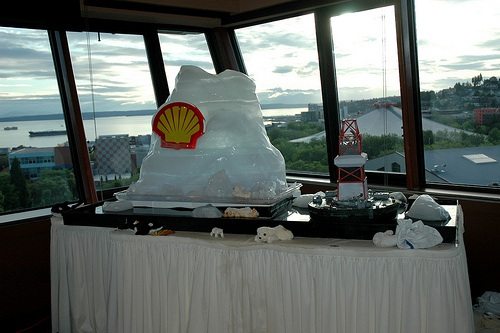
Photo credit: Sabina Boehm
September 27, 2013; Bill Moyers
As of this writing, the captain and crew of the Arctic Sunrise are being held in custody by the Russian government. The Greenpeace ship took activists to a Russian offshore oil platform to protest, through the unfurling of banners, the mining of fossil fuels in the waters of the Arctic. Greenpeace wants the Arctic waters, where sea ice is rapidly shrinking, to be protected from oil drillers.
Sign up for our free newsletters
Subscribe to NPQ's newsletters to have our top stories delivered directly to your inbox.
By signing up, you agree to our privacy policy and terms of use, and to receive messages from NPQ and our partners.
Kumi Naidoo is the executive director of Greenpeace International. Under his leadership, Greenpeace is pursuing a “Save the Arctic” campaign against offshore oil drilling, a battle he calls “the defining environmental battle of our times.” In 2011 and 2012, Naidoo himself was climbing Russian oil rigs. This time, he wasn’t on board the Arctic Sunrise, but his colleagues have found themselves on the wrong side of the Russian authorities.
The Greenpeace activists were grabbed by the Russian coast guard after the Russians rammed and fired warning shots at the inflatable boats from the Arctic Sunrise that ferried the activists to the oil rig. Even though Russia’s tough-guy president, Vladimir Putin, initially agreed that there was no piracy involved, the Greenpeace activists have been charged with exactly that, a very serious charge. Although Putin said that, “It is obvious they are not pirates,” suggesting instead that they had generally violated “international law,” apparently the piracy charges still stand.
Last week, Naidoo told Democracy Now’s Amy Goodman, “We know that five activists, two from Russia, one from Canada, New Zealand, and Poland, have already been sentenced to what is euphemistically called pretrial detention, which is basically detention without trial, for two months. And the charges that they are being investigated are actually piracy…This is a disproportionate use of state authority to try to silence off a very important global conversation that needs to be had, because, right now, we are reaching the tipping points on climate… Sadly, Western oil companies like Exxon and Shell and so on are partnering with Russian state-owned companies, to actually go and try to drill for the last drops of oil in this most fragile, remote, and risky environment for such activities.”
Among the detained Greenpeace activists is the captain of the Arctic Sunrise, the American Peter Willcox, who thirty years ago captained Greenpeace’s Rainbow Warrior, which was protesting nuclear tests in the Pacific when it was blown up by French authorities while docked in New Zealand. Speaking admiringly of Willcox, Naidoo told the Washington Post, “He’s cool, calm and collected…. The people of the United States should be proud one of their fellow citizens is involved in this fight.”
For those nonprofit directors who talk tough and courageous about their beliefs but don’t put themselves out there, or throw staff under the bus when challenged by powerful interests, listen to Naidoo’s statement from 2009, when he took the helm of Greenpeace International: “History teaches us that real change only comes when good men and women are prepared to put their lives and personal safety on the line to advance the cause of justice, equity and peace.” In the nonprofit sector, real courage and commitment sometimes stand out. Our admiration and respect go to Naidoo, and especially to Willcox and the Greenpeace activists who are being detained and face imprisonment by the Russian authorities.—Rick Cohen











